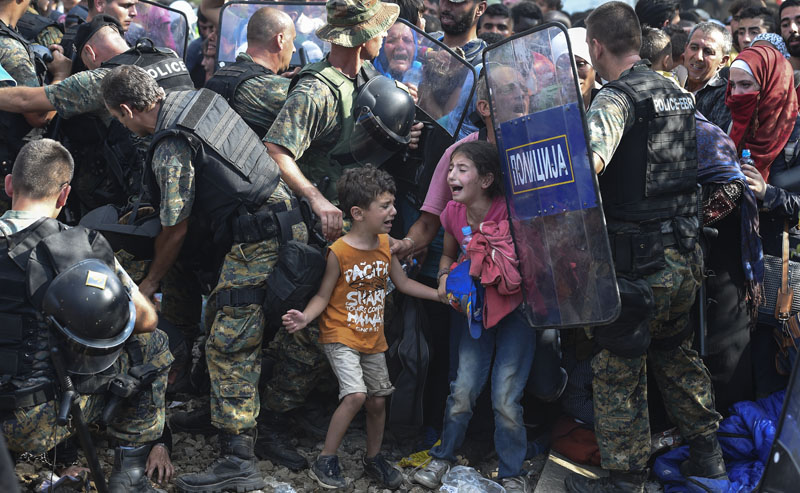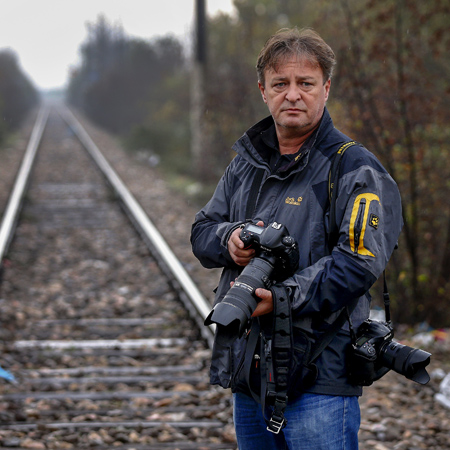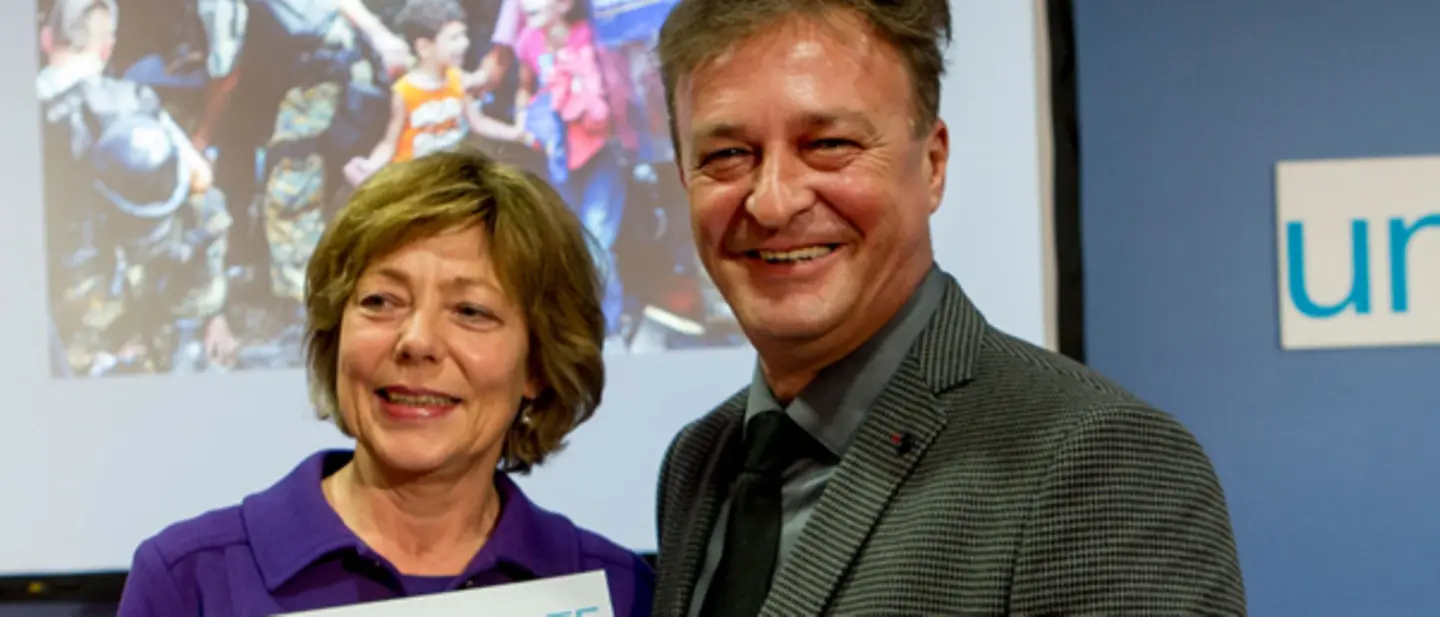UNICEF Photo of the Year
Each year, UNICEF Germany and GEO Germany (from the publishing house Gruner +Jahr GmbH & Co KG) grant the “UNICEF Photo of the Year Award” to photos and photo series that best depict the personality and living conditions of children worldwide in an outstanding manner.
Macedonian Photographer Georgi Licovski is the winner of the competition “UNICEF Photo of the Year 2015”. His reportage depicts the situation of refugees at the border between Greece and Macedonia.
Greek-Macedonian border: Utter despair

It was on August 21, 2015, on the Greek-Macedonian border, that this traumatic situation for two refugee children took place and was witnessed by photographer Georgi Licovski. During his life as a photographer, he thought he had seen his fair share of suffering, from the breakup of Yugoslavia to the expulsion of hundreds of thousands of Kosovo Albanians. But the unsettling situation he had to witness here moved even him and his colleagues to tears. In order to appeal to the emotions of the Macedonian border troops, some refugees send their women and children to the front lines. With the mass of people pushing from the back, children get separated from their parents and are sometimes taken across the border by strangers while their parents and relatives are unable to get through. Another tragedy within this global tragedy that starts in Afghanistan, Iraq and Syria – and obviously doesn’t end in Europe.
According to UNICEF estimates, children make up approximately one-quarter of the 730,000 refugees arriving in the European Union through the Balkan states between January and November 2015.
 Bild 1 von 9 © Georgi Licovski/epa
Bild 1 von 9 © Georgi Licovski/epa Bild 2 von 9 © Georgi Licovski/epa
Bild 2 von 9 © Georgi Licovski/epa Bild 3 von 9 © Georgi Licovski/epa
Bild 3 von 9 © Georgi Licovski/epa Bild 4 von 9 © Georgi Licovski/epa
Bild 4 von 9 © Georgi Licovski/epa Bild 5 von 9 © Georgi Licovski/epa
Bild 5 von 9 © Georgi Licovski/epa Bild 6 von 9 © Georgi Licovski/epa
Bild 6 von 9 © Georgi Licovski/epa Bild 7 von 9 © Georgi Licovski/epa
Bild 7 von 9 © Georgi Licovski/epa Bild 8 von 9 © Georgi Licovski/epa
Bild 8 von 9 © Georgi Licovski/epa Bild 9 von 9 © Georgi Licovski/epa
Bild 9 von 9 © Georgi Licovski/epa
Curriculum Vitae: Georgi Licovski (epa, European Pressphoto Agency)

My name is Georgi Licovski. I am born on March 9th, 1964 in Bitola, Macedonia.
I finished middle school and high school in Skopje, and then started my studies at the Faculty for Mechanical Engineering. At the same time I started experimenting with photography, which very quickly became an important part of my life. I left the university in order to focus more on it.
My beginnings are tied with taking wedding pictures which was very profitable, but after a short period I decided to try to enter into news photography because it was a challenge for me. I was fortunate to begin at "Nova Makedonija" (New Macedonia) which was the biggest and most influential daily newspaper in the country. This happened in the distant year of 1989.
In two years the breakout and wars started in the territory of former Yugoslavia. Macedonia was becoming an independent country for the first time in its history. It was a big privilege to take pictures of the creation of the country, witnessing all the events that were happening in those uneasy times.
The departure of the Yugoslavian military from the Macedonian territory caused great tensions and war was hanging in the air. I was one of the people taking photos of the departure of JNA and that became a turning point in my life. An EPA photographer came to Macedonia looking to buy some photographs from the pullout as well as someone who understood the current situation. Luckily I was that man, and so my collaboration with EPA began in 1991. I spent a few years working as a stringer on all the major events that were happening in and around Macedonia. With the arrival of the Kosovo crisis I already had some experience behind me and was competing with well-known photographers who rushed into Macedonia in big numbers. It was then that I first faced the horrible refugee crisis and the exodus of Albanians from Kosovo. Half a million people left Kosovo and came to Macedonia. It was horrible situation drawing world attention. At the time I was documenting the situation without fully understanding the complexity of what was happening. The arrival of NATO troops in Macedonia, and their entry into Kosovo was an unseen media event, the refugees could go back to their homes. I hoped that I wouldn’t be a witness to such human suffering again. I was wrong.
The war in Macedonia in 2001 was very emotional for me, but I was better prepared for the challenge. From a professional point of view, I did well, but emotionally I was in bad condition. My agency was pleased with me, but I had enough of wars and suffering, so that year I started covering international sport, a dream from when I was young.
I soon entered EPA's sports team covering most world European championships. I really found myself, because I was taking pictures of young, happy and healthy people. There is no violence, everything is well organised in controlled conditions and the pictures play well in the media. It's a privilege to take sports pictures. Even better is the great friendship among EPA photographers and relations with the editors. Those were 14 marvellous years. In the meantime I would also cover news, but far from the major stories in the world with exception of the occasional tensions and conflicts.
In April this year yet again I was faced with the beginnings of a big story, the migrants who passed Macedonia seeking a better life. At first there wasn't much interest from the European and American newspapers but I went into it with all my heart and soul because I saw that another exodus was forming that would shake the world. As time passed the story was getting bigger, the pictures more horrible, the interest higher. For me at this time, my publications in the biggest newspapers of the world were not as important as it was to capture and show the human suffering and tragedy of those people and show the world the horror that was happening. To try and help these people by reporting daily of what is going on, to try and wake the consciousness of the powerful people of the world, showing in explicit terms what the refugees go through every day on their path to a better life.
Time will show if we succeeded in our efforts, not only to report but also to help.
In any case I know that not many things have profiled me in my life as this refugee crisis, a story I continue to document.
Interview with Georgi Licovski
"I can’t forget the children whose fasces were terrified by the chaos" - an interview with Georgi Licovski.
